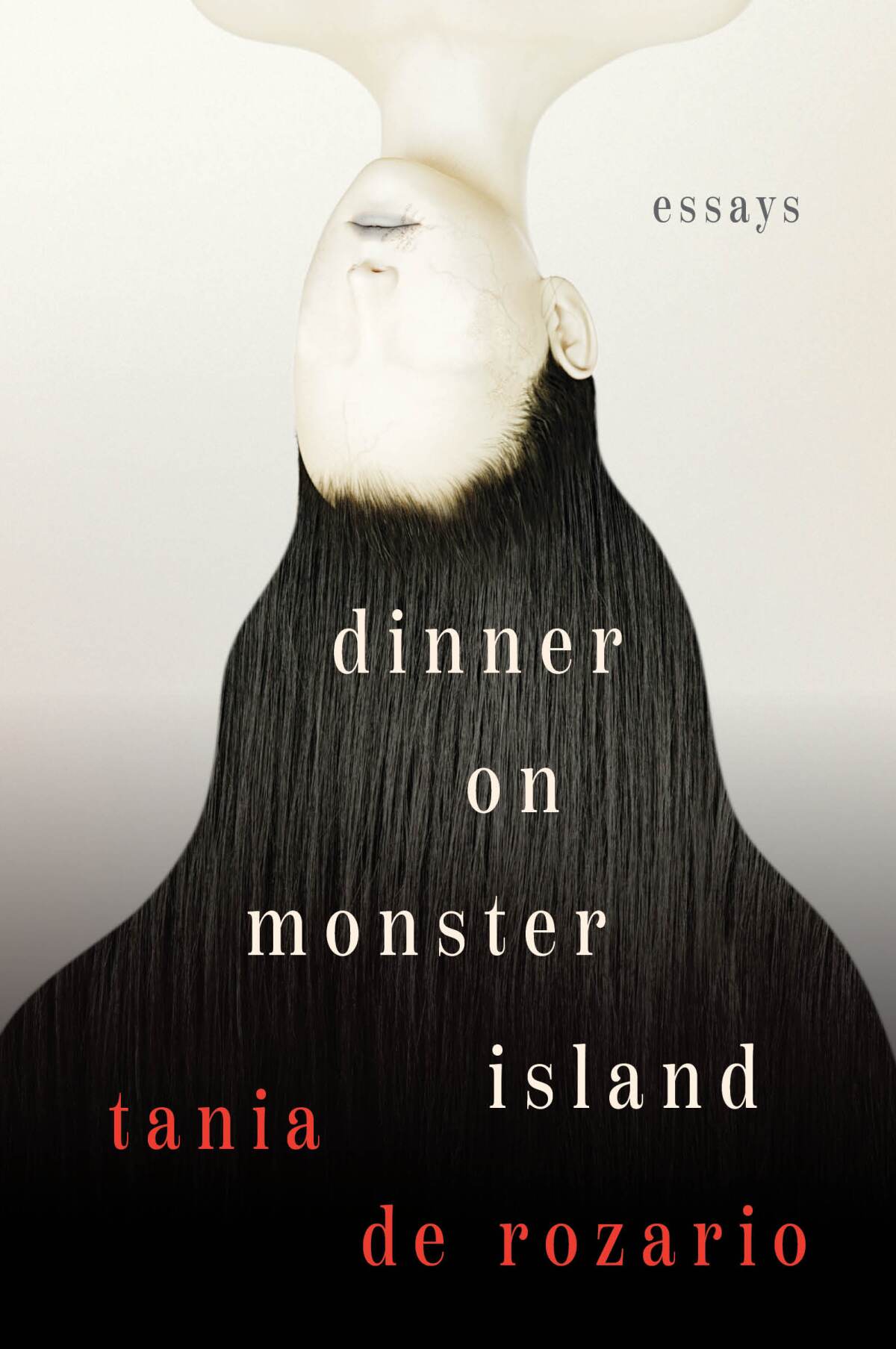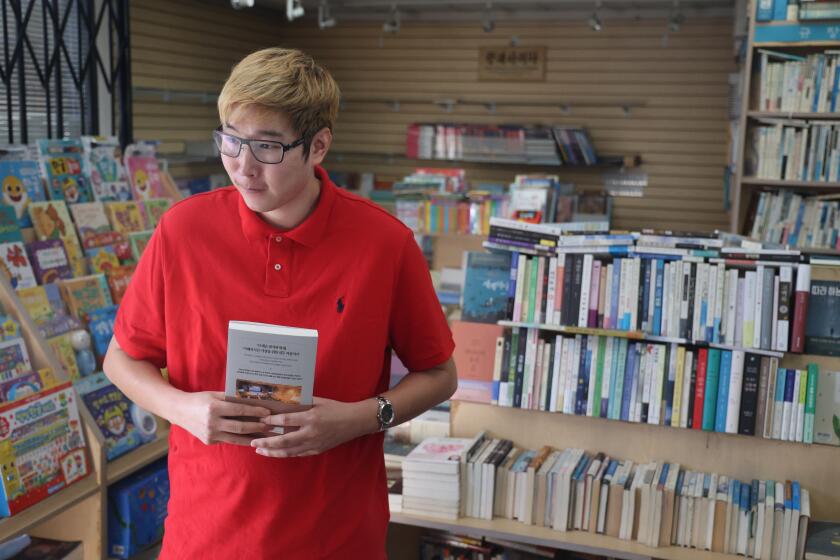Freed from conservative Singapore, a queer writer finds complicated truths of ‘Monster Island’

Book Review
Dinner on Monster Island
By Tania De Rozario
Harper Perennial: 192 pages, $18
If you buy books linked on our site, The Times may earn a commission from Bookshop.org, whose fees support independent bookstores.
When Tania De Rozario moved from Singapore to Canada, she expected to miss elements of her home country. What she didn’t anticipate was crying every night for a month, “not from homesickness, but from relief.”
She had lived in Singapore for 37 years, grown up and discovered her queerness and found the courage to leave her mother’s homophobic home there. She’d worked as a teacher, writer, artist and curator there. She’d fallen in love and had her heart broken there. Despite her appreciation for the island — and especially the community that helped to keep her afloat — the relief of being away from an overbearing and overreaching government was palpable.
In the title essay of her new collection, “Dinner on Monster Island,” De Rozario grapples with the complexity of this feeling, wondering whether leaving her fellow artists and activists behind makes her a monster. Much like the rest of the book, this piece refuses simple answers.
Among the admirable aspects of De Rozario’s major publisher debut (her previous prose and poetry books came out with Math Paper Press) is this insistence on dwelling in gray areas and allowing space for conflicting narratives and reinterpretations. In the first essay, “Salvation,” the author narrates her mother’s conversion to Pentecostalism and subsequent hounding of De Rozario’s grandmother to leave her devout Catholicism behind. On the day young De Rozario learns that her grandmother has succumbed to the pressure, she finds the woman smashing a beloved painting of the Last Supper with a hammer, enacting violence on the final beloved piece of art left in the otherwise idol-less home.
Later in the essay, readers learn that De Rozario was subjected by her mother and her church friends to a seven-hour exorcism meant to banish her sin of queerness. What she remembers most about the day was when the church friends condemn the angry look on her face, claiming her snarl is evidence of the devil inside her.

“Despite seven hours of being yelled at, of being manhandled,” De Rozario writes about her child self, “[o]f watching them burn your belongings on the kitchen stove. Of being told: Your desire is the devil. Your clothes are the devil. Your body is the devil. Despite this, years later, what will make your skin bristle with indignation is the memory of being told that even your rage is not your own, not your right, not a natural conclusion to this madness.”
De Rozario eventually moves out and stops speaking to her mother, even as most of her friends continue living rent-free with their parents until getting married. When she learns that her dying mother wants to make amends, her anger fortifies her, and she refuses to go to the hospital. She doesn’t regret the decision.
Yet in a later essay, “I Hope We Shine On,” she discusses how both her parents joined cultish religious groups, and she confronts the fact that according to experts, no particular type of person is more or less susceptible to indoctrination. Instead, victims of cults are usually situationally vulnerable, contending with difficult life circumstances at the time of recruitment.
“It’s easier for me to think of my parents as people who were supposed to love me but didn’t,” De Rozario admits, “instead of people whose circumstances left no room for love. Easier for me to believe they made bad decisions that I never would, than to believe that I too am vulnerable.” Monsters, in other words, don’t always start out that way, and are often victims as well as perpetrators.
The debut novel from Leo Vardiashvili, ‘Hard by a Great Forest,’ has its commercial trappings but ultimately lands with lyrical and heartbreaking resonance.
For the record:
3:50 p.m. Feb. 6, 2024An earlier version of this review alluded to the horror film “The Exorcism.” The title is “The Exorcist.”
The essays in Part I are threaded with cultural criticism, the author drawing beautiful parallels between her experiences with her mother, her body and her government and horror films like “The Exorcist,” “The Shining,” “Doctor Sleep” and “Carrie.” In “Becoming Monsters,” De Rozario locates the origin of her obsession with monstrosity in “Ringu,” the 1998 Japanese film directed by Hideo Nakata, and specifically in the movie’s antagonist Sadako Yamamura — the iconic pale girl wearing white, her long, dripping black hair covering most of her face. The essay explores the figure’s influence on subsequent Asian horror films in particular as well as the inspiration behind Sadako Yamamura’s appearance, which De Rozario locates in a broader cultural history of ghostly feminine monstrosities that exist across Asia in figures like Indonesia’s Sundel Bolong, Japan’s Ubume, India’s Churel and others. De Rozario finds that more often than not, these monsters are victims first, turned into monsters by what was done to them.
Bethanne Patrick’s February picks include new work from Salman Rushdie and Zadie Smith, plus fresh insights into friendship, Silicon Valley and wolves.
The blurriness that can occur between victim and perpetrator is a recurring motif throughout the book, and in the title essay, De Rozario keenly gives insight into the reason she’s so interested in this uncomfortable space. In 1993, right around the time she was being exorcised, Wired sent science fiction author William Gibson to Singapore and subsequently published “Disneyland With the Death Penalty,” an essay De Rozario understandably finds offensive and incorrect. Yet its title resonates with her (indeed, the death penalty in Singapore notoriously is used against nonviolent drug offenders) as does Gibson’s interest in what the lack of police presence in public spaces in Singapore speaks to. “Who needs CCTV cameras when we already excel at policing one another?” she asks. Living in a society where she was expected to be complicit in policing her own actions as well as those of her peers took a toll on the author; no wonder she felt a deep relief when she freed herself from those constraints.
With clear, precise language, “Dinner on Monster Island” is a taut and riveting collection. Despite being published by the American Harper Perennial, it isn’t U.S.-centric, which makes its viewpoint that much more refreshing.
Masad is a books and culture critic and author of “All My Mother’s Lovers.”
More to Read
Sign up for our Book Club newsletter
Get the latest news, events and more from the Los Angeles Times Book Club, and help us get L.A. reading and talking.
You may occasionally receive promotional content from the Los Angeles Times.








